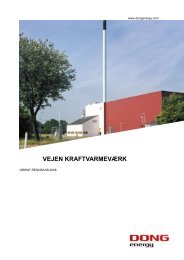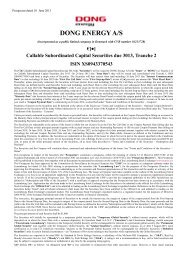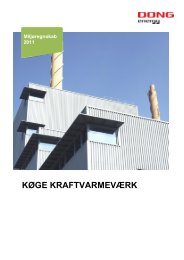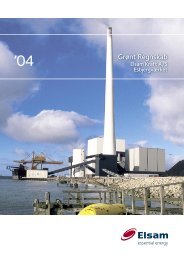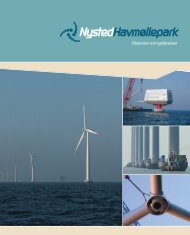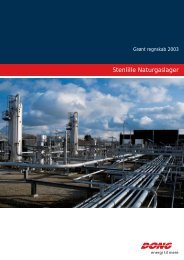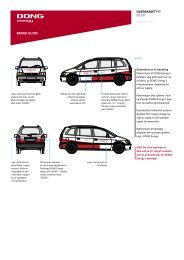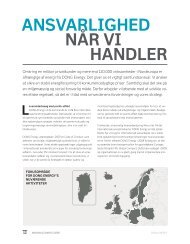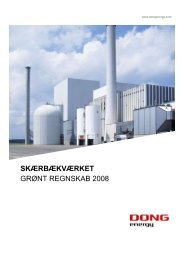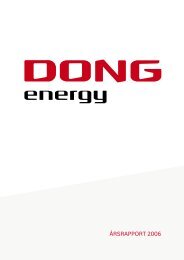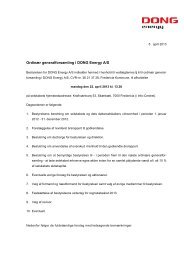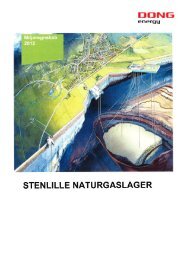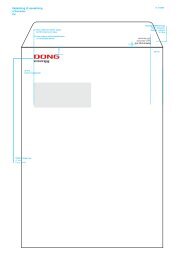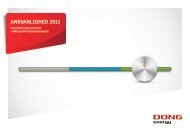ANNUAL REPORT 2011 - DONG Energy
ANNUAL REPORT 2011 - DONG Energy
ANNUAL REPORT 2011 - DONG Energy
Create successful ePaper yourself
Turn your PDF publications into a flip-book with our unique Google optimized e-Paper software.
RIsk AND RISK MANAGEMENT<br />
Regulatory risks<br />
regulatory conditions<br />
Changes in regulatory conditions in both Denmark and abroad<br />
are material to <strong>DONG</strong> <strong>Energy</strong>’s strategic opportunities and<br />
thus also its future earnings. However, <strong>DONG</strong> <strong>Energy</strong>’s growing<br />
international presence is reducing its dependence on regulatory<br />
changes in the individual countries, such as changes to<br />
subsidy schemes in connection with investments in wind generation<br />
and changes to public regulation of electricity and gas.<br />
<strong>DONG</strong> <strong>Energy</strong>’s presence in several stages of the value chain is<br />
contributing to reducing the effects of regulatory changes in<br />
individual stages of the value chain. Furthermore, <strong>DONG</strong><br />
<strong>Energy</strong> follows political and regulatory developments closely in<br />
the countries in which this is relevant, and takes an active part<br />
in connection with consultations on draft legislation and other<br />
regulatory proposals that involve a risk of material changes.<br />
tax regimes<br />
Changed tax regimes may have a material effect on the<br />
Group’s financial results, including in connection with oil and<br />
Operational risks<br />
Construction and operation of facilities<br />
<strong>DONG</strong> <strong>Energy</strong> has a number of risks associated with the development,<br />
construction, operation and maintenance of facilities,<br />
and these risks cannot all be directly hedged. <strong>DONG</strong><br />
<strong>Energy</strong> continuously focuses on avoiding and preventing inexpedient<br />
situations by means of inspection, improvement<br />
of maintenance programmes and internal and external<br />
checks of production equipment and facilities. A number of<br />
insurance policies have been taken out to protect the value<br />
of the assets, where possible. The subsidiary <strong>DONG</strong> Insurance<br />
A/S was established to optimise the<br />
insurance portfolio and is subject to supervision by the<br />
Danish Financial Supervisory Authority.<br />
Risk governance<br />
Board of Directors<br />
Audit and Risk Committee<br />
Executive Board<br />
Finance Committee<br />
Risk management<br />
Business areas<br />
50<br />
manaGEmEnt’s rEviEw – <strong>DONG</strong> ENERGY GROUP <strong>ANNUAL</strong> <strong>ANNUAL</strong> <strong>REPORT</strong> <strong>REPORT</strong> <strong>2011</strong> <strong>2011</strong><br />
Group Risk Control<br />
Mandates<br />
gas extraction. <strong>DONG</strong> <strong>Energy</strong>’s tax risks are assessed and<br />
managed on a continuous basis using the Group’s tax policy<br />
and tax strategy. <strong>DONG</strong> <strong>Energy</strong> seeks open dialogue with tax<br />
authorities and other public authorities and, wherever possible,<br />
endeavours to obtain binding advance indications from<br />
the authorities to clarify major tax-related risks. Because of<br />
the Group’s international presence, <strong>DONG</strong> <strong>Energy</strong> maintains<br />
a fair transfer pricing system based on OECD guidelines.<br />
financial regulation<br />
The financial crisis has led to a desire among European<br />
regulators for a tightening of the rules on derivatives trading.<br />
This has led to three strands of new regulations (EMIR,<br />
MiFID and REMIT) that may have considerable implications<br />
for <strong>DONG</strong> <strong>Energy</strong> in terms not only of tied-up funds but also<br />
stricter capital requirements. <strong>DONG</strong> <strong>Energy</strong> follows developments<br />
closely and continually analyses whether it is necessary<br />
to adjust the current business model. The REMIT<br />
Regulation came into force on 28 December <strong>2011</strong>.<br />
subcontractors<br />
There are risks associated with the implementation of investment<br />
projects, which may be delayed due to factors such as<br />
delays in installation and transit vessels, commercial and<br />
partner-related factors, breach of contract by suppliers and<br />
subcontractors and, for wind farms, cable-laying. Moreover, a<br />
large part of the equipment required is ordered in markets<br />
that are often characterised by a high level of activity and<br />
where competition may be limited. To mitigate these risks,<br />
<strong>DONG</strong> <strong>Energy</strong> has acquired extensive internal knowledge<br />
and expertise. By acquiring A2SEA and CT Offshore, the<br />
Group has gained control of important expertise in installation<br />
logistics related to the establishment of wind farms,<br />
enabling the processes to be optimised.<br />
The Board of Directors has the overall responsibility for<br />
<strong>DONG</strong> <strong>Energy</strong>’s risk policy. To achieve transparent, efficient<br />
risk management, <strong>DONG</strong> <strong>Energy</strong> has organised its risk<br />
management in a number of decision-making bodies.<br />
• The Audit and Risk Committee’s main risk management<br />
role is to support the Board of Directors in its supervision<br />
of the risk policy pursued.<br />
• The Executive Board continuously assesses and adjusts<br />
the internal control and risk management systems.<br />
• The Finance Committee monitors the Group’s risks and<br />
financing as well as the management of mandates relating<br />
to market price risks.



